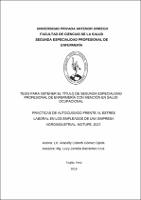Prácticas de autocuidado frente al estrés laboral en los empleados de una empresa agroindustrial. Motupe, 2017

Ver/
Descargar
(application/pdf: 648.2Kb)
(application/pdf: 648.2Kb)
Fecha
2019Autor(es)
Gómez Ojeda, Aracelly Lisbeth
Metadatos
Mostrar el registro completo del ítemResumen
El autocuidado, es un importante aspecto que presenta un complejo mecanismo de aprendizaje de conductas que conlleven al organismo a mantener su estado de salud, la falta de ellas en el ámbito laboral puede generar estrés, afectando la productividad y calidad de vida al trabajador. Conociendo el autocuidado, surge el problema de esta investigación: ¿Cuáles son las prácticas de autocuidado que son empleadas por los trabajadores de una empresa agroindustrial frente el estrés laboral?, esta investigación cualitativa con abordaje metodológico de estudio de caso, tuvo por objetivo: determinar y analizar las prácticas de autocuidado frente a estrés laboral. Se recogió información a través de una entrevista abierta, de una población muestra de 20 empleados administrativos (por saturación y redundancia), obteniendo las categorías siguientes: Satisfaciendo parcialmente necesidades esenciales y Preservando su buena salud frente a enfermedades. Las conclusiones fueron: Los empleados realizan actividades de autocuidado frente al estrés como la respiración profunda pero sin ninguna pauta por algún personal de salud, además tratan de evitar las comidas del día supliéndolo con productos comestibles no saludables por tratar de cumplir con tareas asignadas, están 14 horas fuera de casa desde muy temprano alterando su ciclo del sueño, acuden a exámenes médicos ocupacionales que realiza la empresa y otros deciden hacerse chequeos particulares, también buscan practicar algún deporte, actividad de ocio, para liberar el estrés o planifican un viaje durante el año. Self-care is an important aspect that involves complex learned behaviors aiming to maintain good health, and the lack of it at the workplace can generate stress for workers, affecting their productivity and life quality. The objective of this qualitative research using case study approach was to identify and analyse the self-care practices adopted by
workers of a agricultural industry facing occupational stress.. Data collection was performed through open interview with a sample population of 20 administrative employees (by saturation and redundancy), regarding the following categories: Partially satisfying essential needs and Preserving your good health avoiding diseases. The conclusions were: Employees perform self-care activities in face of stress such as deep breathing, but without guidance from a health care specialist . Also, they often substitute daily meals by eating unhealthy products in order to have more time to fulfill the tasks assigned for the day. They are usually 14 hours away from home, from very early in the day, altering their sleeping cycle. Some employees perfom occupational medical examinations in clinics where the company takes them, while others go to private clinics for completing their medical analysis. They also seek to playing some sport, having leisure activities or planning a trip along the year as a way to relieve their stress.

